Championship play-off final: Analysing historic trends
Published:
The Championship play-off final 2022 is set to take place at Wembley Stadium on May 29 and is often referred to as the richest game in football.
At stake is a place in the Premier League, in which far higher levels of income flow from both prize money and broadcast deals. Even a single season in the English top flight can have a transformative effect on the finances of a club, which is why so many owners are prepared to spend heavily in an attempt to reach it.
While the Premier League has existed since 1992, the current play-off format was established in the 1995-96 season after the top flight was reduced to 20 clubs.
The teams finishing first and second in the Championship table are promoted automatically, while the four next highest-ranked teams – those finishing between third and sixth – contest two-legged semi-finals followed by a single final.
This will be the 27th consecutive season that this approach has been used to decide the third promoted team and we have analysed the previous 26 for clues about how things will play out this year.
Does league position matter?
Over a typical 46-game season it is reasonable to expect that a team finishing third will be stronger than those below it, but luck can play a part over a much smaller number of matches.
While the third-placed teams have had the most success under the current format, reaching the final in 18 out of 26 attempts, only 10 have gone on to earn promotion.
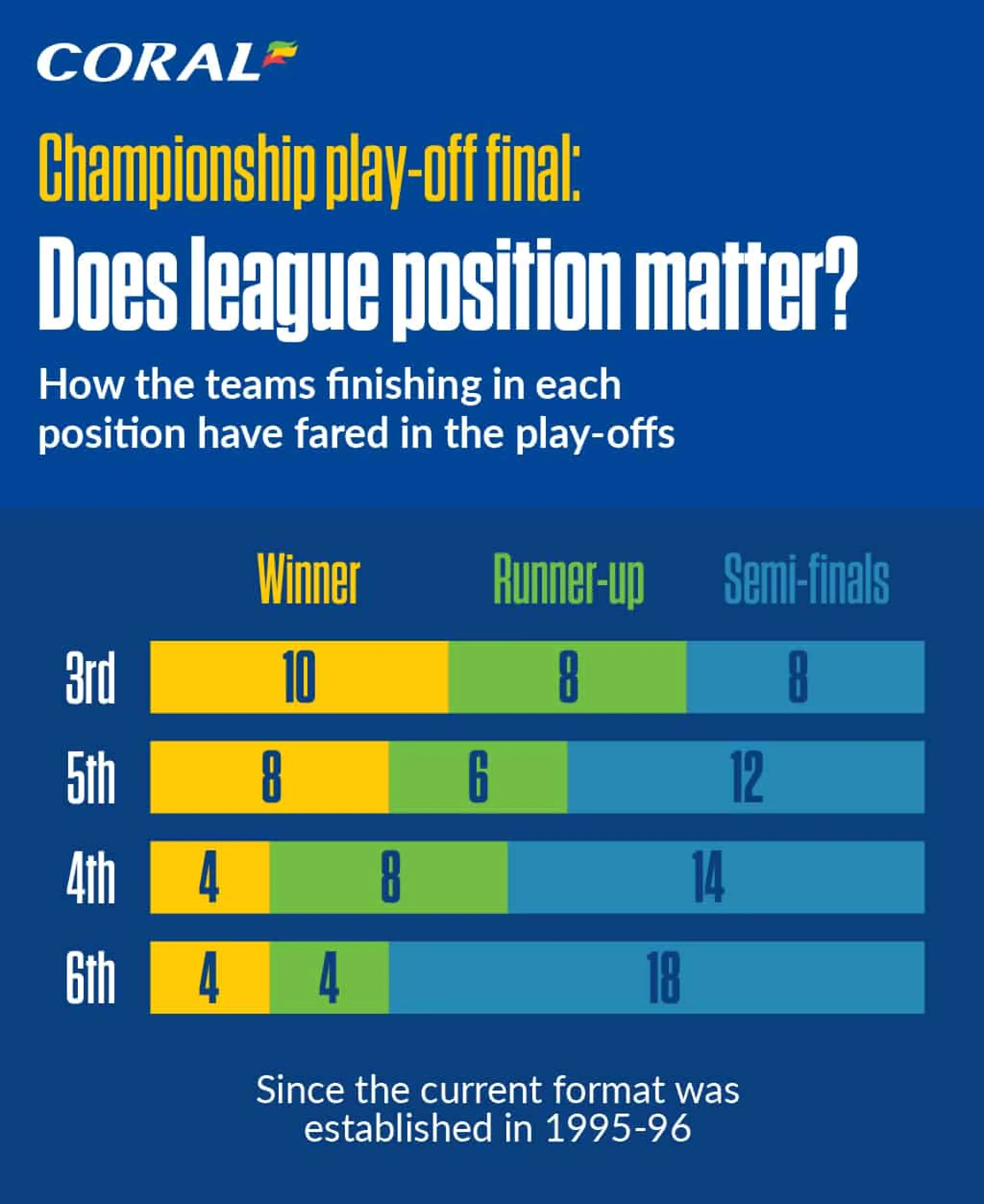
Interestingly it is not the fourth-placed teams who are the next most effective, with those finishing fifth winning a Premier League place twice as often: eight to four. This includes two of the last five clubs promoted via the play-offs: Huddersfield in 2017 and Aston Villa two years later.
The lowest-ranked play-off teams do tend to fare the worst however, reaching only eight finals out of a possible 26 and winning promotion in just four of those. The last club to triumph in the Championship play-off final after finishing their league campaign in sixth place was Blackpool back in 2009-10.
Does the best team win?
We can also look at clubs’ head-to-head records to determine how much faith we can place in their league performances when forecasting a winner.
For each of the last 26 seasons we have calculated a ‘mini-league’ for the four play-off teams based on their results against each other. This turns out to be a fairly robust predictor, with 19 of the 26 Championship play-off finals having been won by one of the teams with the best two records against the other contenders.
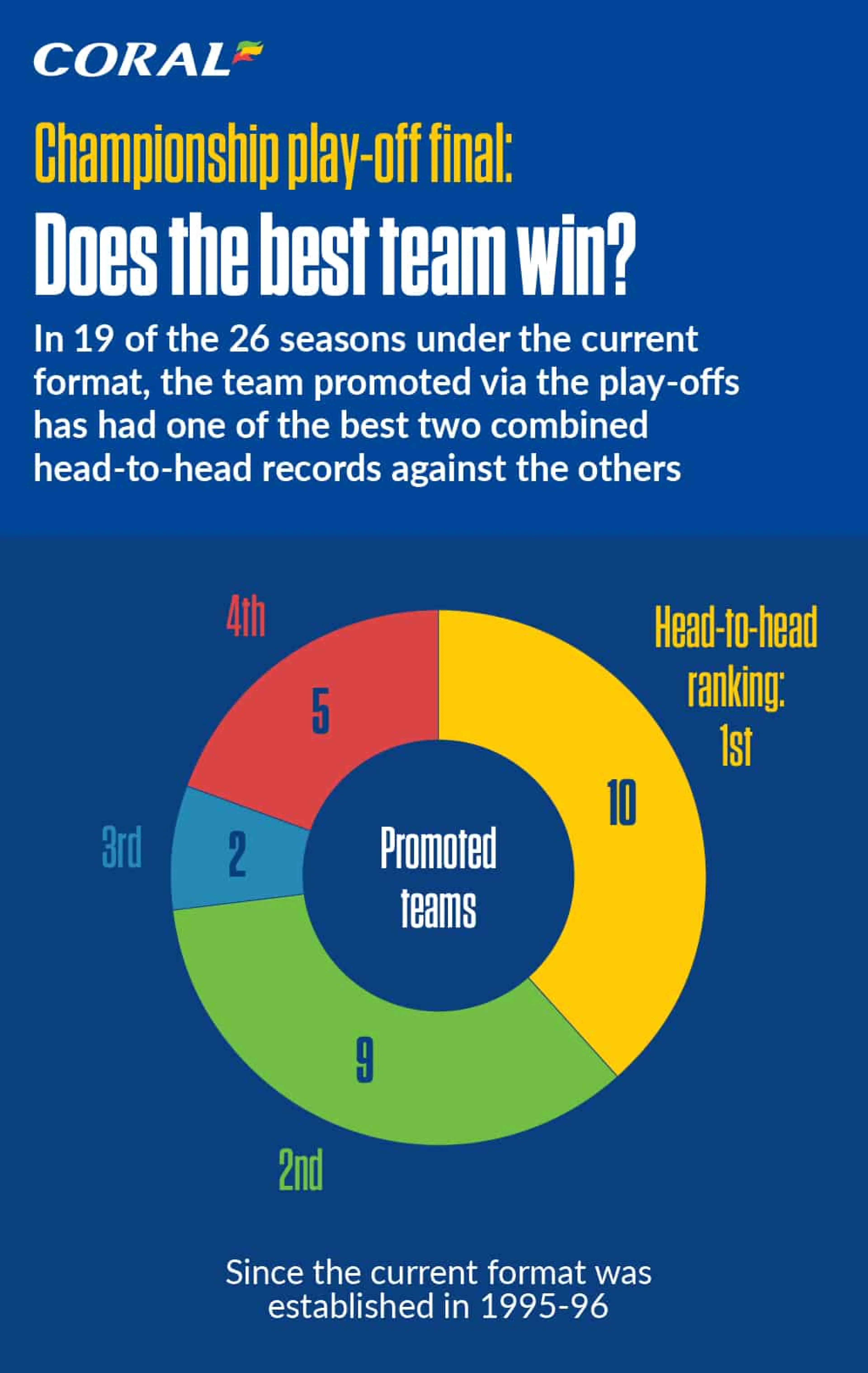
While we have witnessed a few surprises recently – with Hull in 2016 and Huddersfield a year later both securing promotion despite taking just three points from a possible 18 in their league meetings with the other play-off teams – this has been the exception rather than the rule.
The other 13 seasons in the last 15 have seen the Championship play-off final won by a club with one of the two best head-to-head records.
Does a strong attack or defence matter more?
While sustained success requires strength in both attack and defence, it is possible to reach the play-offs while being average at one end of the pitch provided you excel at the other.
For example, West Ham went up in 2005 despite scoring just 66 league goals – fewer than their three play-off rivals – thanks to their tight defence, which saw them grind out a 1-0 win in the final.
Slightly more recently, Blackpool’s 3-2 win over Cardiff in the 2010 final showed how having the strongest attack among the four play-off qualifiers that season compensated for also operating the leakiest rearguard.
We can determine whether attack or defence is more valuable by ranking every play-off team’s league record and seeing how often the best get promoted.
It turns out that being able to score goals has been more helpful than preventing your opponent from doing likewise, with one of the best two attacks going up 19 times out of a possible 26 compared to 15 teams promoted with one of the two tightest defences.
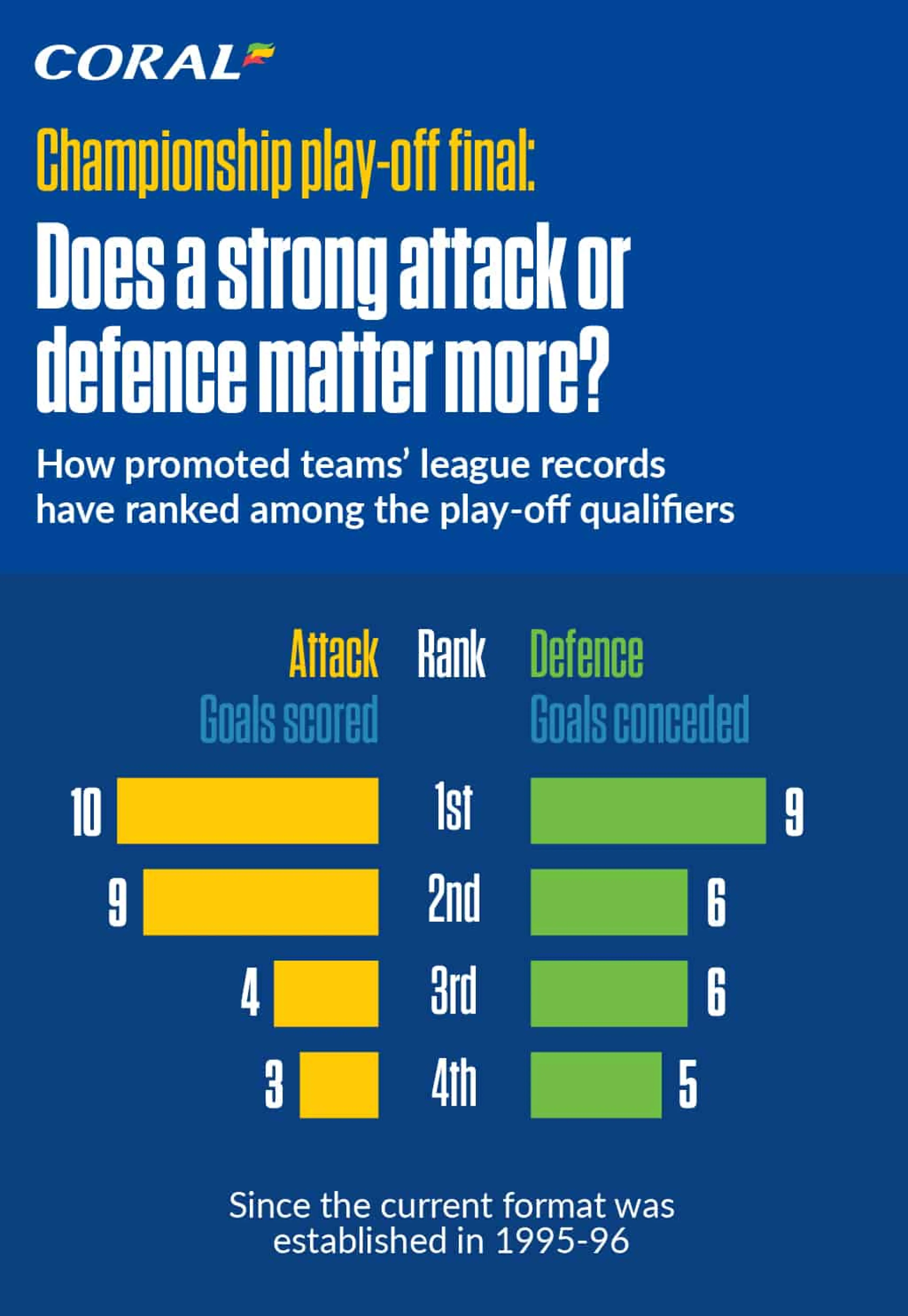
This is borne out by recent evidence, with three of the last four play-off finals having been won by one of the two most prolific teams in contention. Meanwhile just two of the last five teams promoted via the play-offs had one of the two best defensive records and both of those were second best.
How will this year’s Championship play-off final unfold?
With so much money at stake, recent finals have tended to be cagey affairs. The epic 4-4 draw between Charlton and Sunderland – ultimately settled on penalties – in 1998 seems to be a thing of the past.
Seven of the last 10 finals saw fewer than three goals scored and the same proportion saw the losing team fail to even get on the scoresheet.
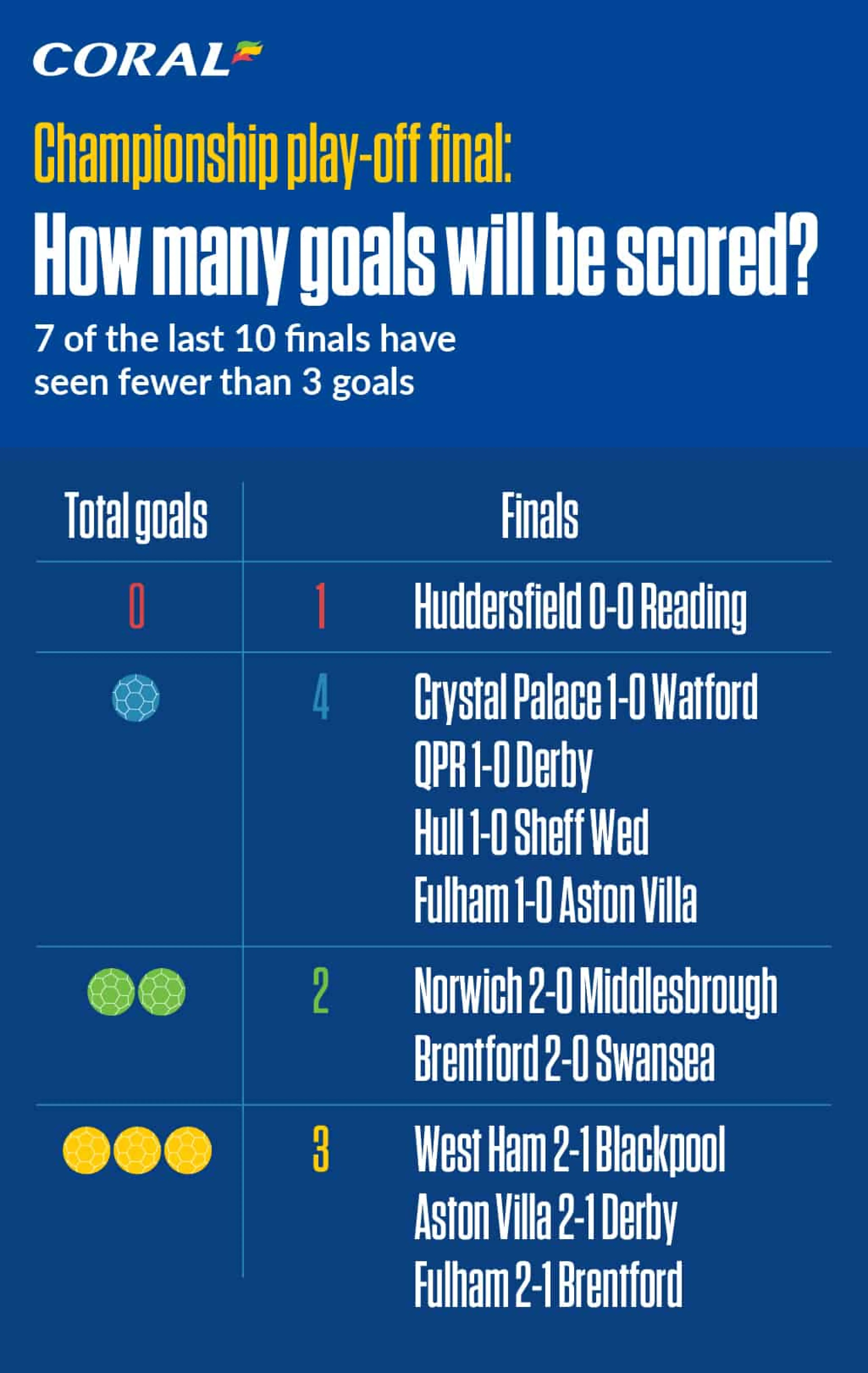
With just 17 goals scored in total across the 10 most recent play-off finals – and just seven of those before half-time – it would be optimistic to expect a thriller this season.
How do play-off winners fare in the Premier League?
Turning our attention towards the longer term, we can also look at how promoted teams fare immediately after reaching the top flight.
Even with Watford and Norwich making an immediate return to the Championship this season, teams who secure automatic promotion have survived more often than those coming up via the play-offs.
Of the 26 clubs promoted in first place under the current format, 16 have avoided relegation the following year while a similar proportion (15) of those who went up in second place have done so.
Teams who had to navigate the play-offs have coped less effectively, with more than half – 14 out of 26 – dropping straight back down.
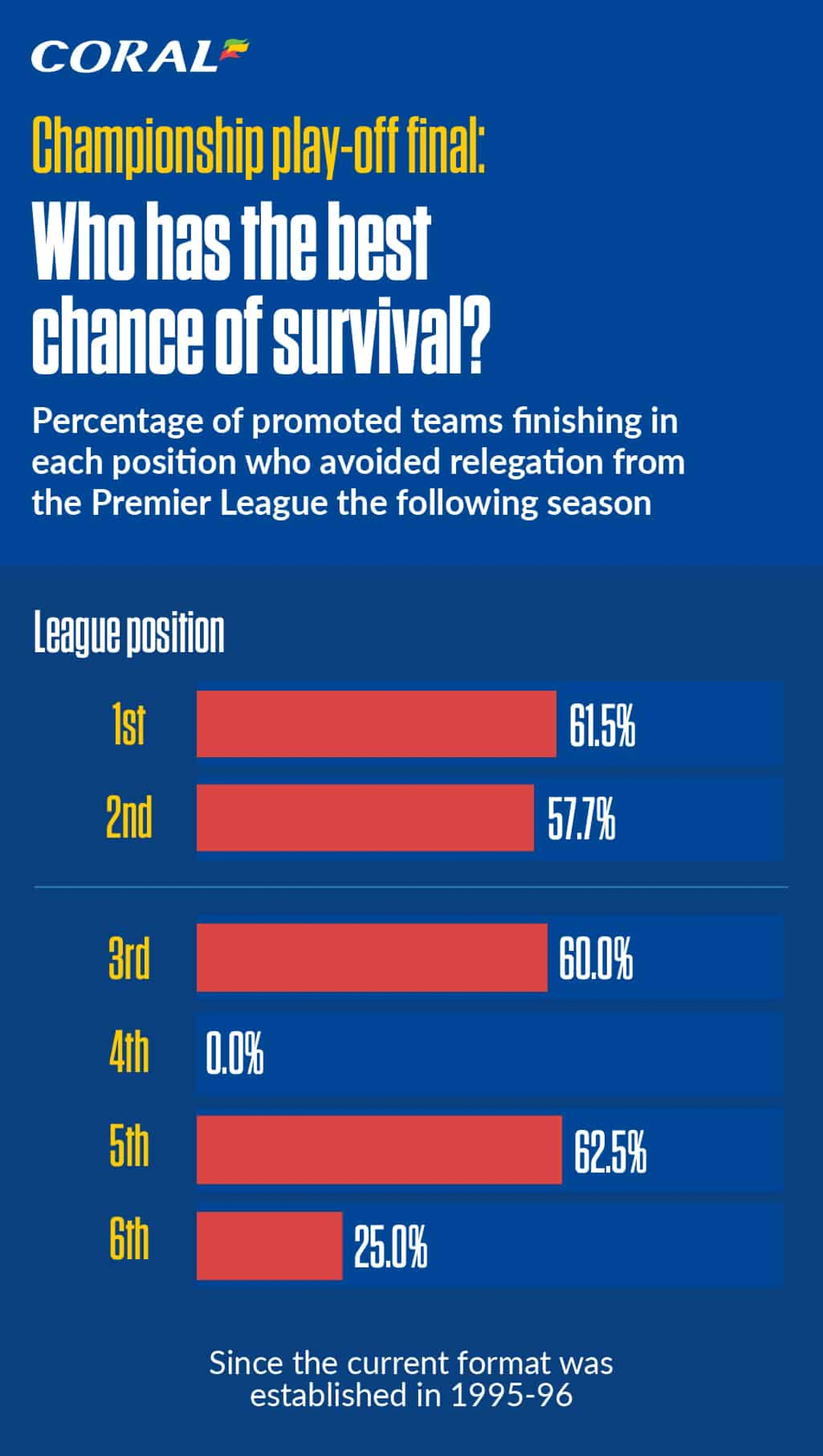
However, the Championship play-off winners who finished in third – like Brentford last season – or the lucky fifth spot have a similar collective survival rate to teams promoted as champions.
Meanwhile only one of the eight clubs to have reached the Premier League after finishing fourth or sixth was able to avoid relegation the following season: Wigan back in 2005.
All odds and markets correct as of date of publication









